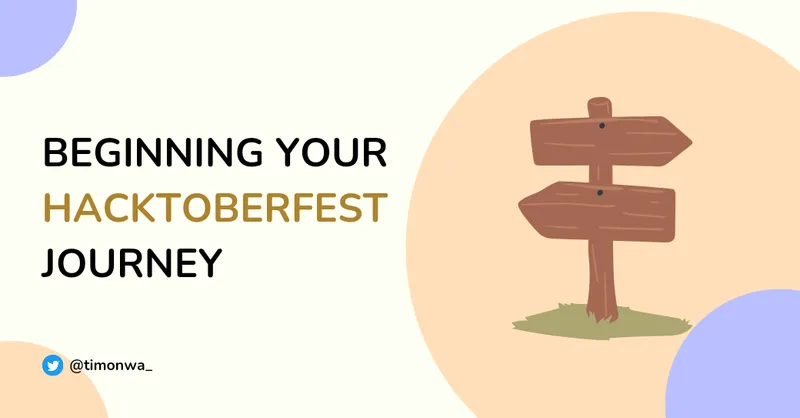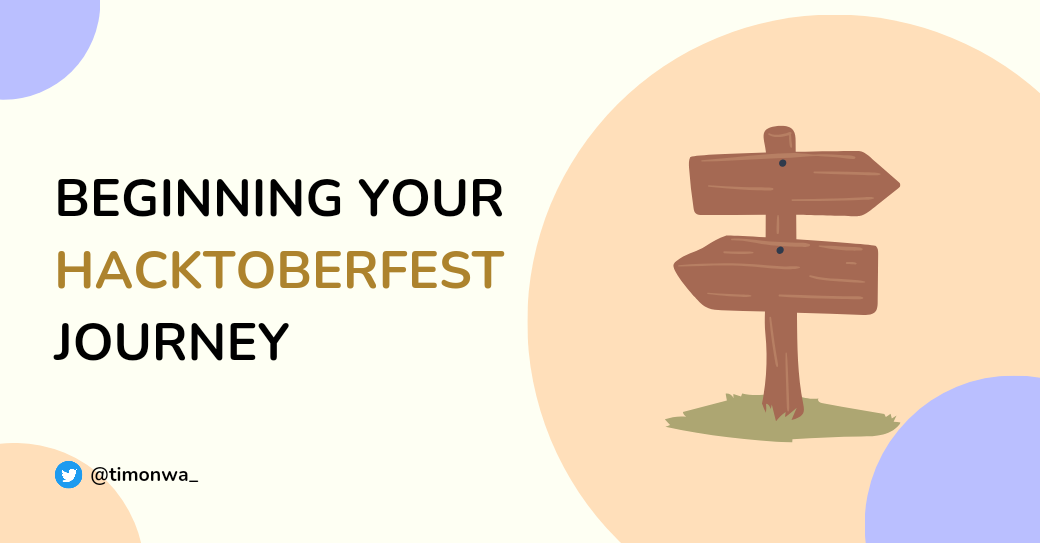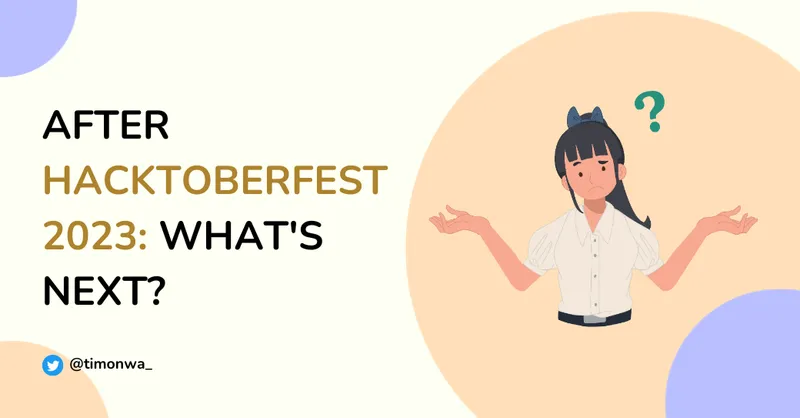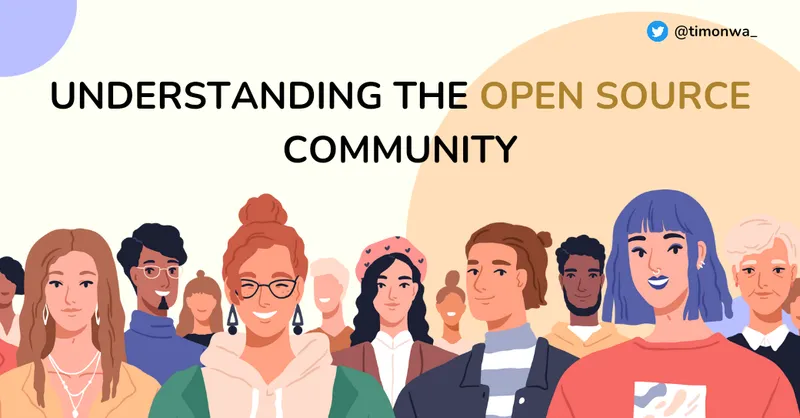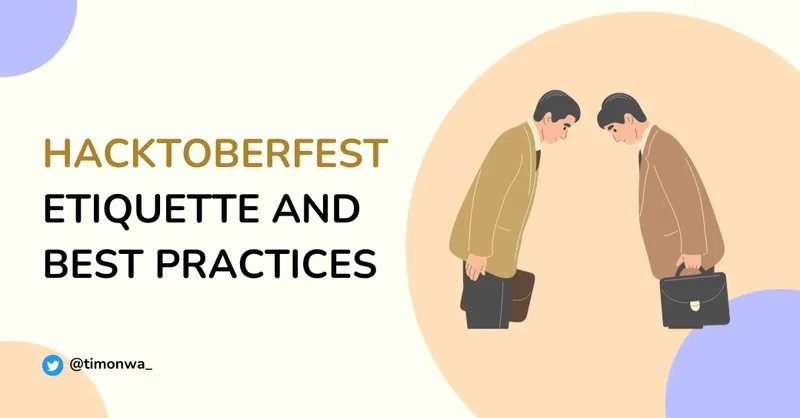The best journey is the one that is taken with good company. ~ Unknown
Open source is more than just a buzzword in the world of technology. It’s a dynamic, collaborative ecosystem where passionate individuals from across the globe come together to build, innovate, and share. And Hacktoberfest, a month-long celebration of Open source, is your ticket to dive headfirst into this exciting world.
Hi everyone! Welcome to The Beginners Guide to Hacktoberfest, an eight-part series designed to help you on your open-source adventure. Whether you’re an aspiring developer, a student eager to learn, or simply someone curious about the magic behind the software that powers our lives, this series is tailor-made for you.
For the next eight days, we will discuss all things Hacktoberfest. We’ll cover everything from the basics of Hacktoberfest to the etiquette and best practices of open source contributions. By the end of this series, you’ll be ready to embark on your Hacktoberfest journey with confidence.
But before we begin this journey, let’s answer the essential questions: What is Open source? Why does it matter? And why should you care about Hacktoberfest?
What is Open source?
Open source is a term used to describe software that is freely available for anyone to use, modify, and share. It’s a collaborative effort where developers and contributors from worldwide come together to build, innovate, and share. Open-source software powers the internet, from the websites we visit to the apps we use. It’s everywhere, and it’s here to stay.
You might be wondering, “Am I using open-source software?” The answer is yes! If you’ve ever used Firefox, WordPress, or VLC Media Player, you’ve used open-source software. Open source is all around us and in everything we do.
Some of the most popular open-source projects include:
-
Mozilla Firefox: A popular open-source web browser for safe and private browsing.
-
LibreOffice: A free, open-source office suite for word processing, spreadsheets, presentations, and more.
-
Audacity: An open-source audio editing and recording software for creating and editing audio content.
-
GIMP (GNU Image Manipulation Program): An open-source image editor for tasks like photo retouching and image composition.
-
VLC Media Player: A versatile open-source media player supporting various multimedia formats.
-
WordPress: An open-source content management system (CMS) that powers websites and blogs.
-
Thunderbird: An open-source email client for managing emails, contacts, and calendars.
-
Krita: An open-source digital painting application for artists and designers.
-
HandBrake: An open-source video transcoder for converting video files into different formats.
-
Calibre: An open-source e-book management tool for organizing and reading e-books.
If it is free, how do developers make money?
Open source is free, but it’s not free of cost. When we say “it’s not free of cost,” we mean it is not free to develop and maintain. Developers spend a lot of time and effort building and maintaining open-source software. They do it because they love it but also need to make a living.
For developers to make money, they offer paid services like support, training, and consulting to individuals and businesses. They also make money by selling add-ons, plugins, and themes. Some developers even offer paid versions of their software with additional features.
Open source is free, but it’s not free of cost.
And if you’re wondering, “Why would anyone pay for something that’s free?” The answer is simple: convenience. Paid services offer convenience and peace of mind. They save you time and effort, and they’re worth every penny.
If you use free open-source software, consider donating or purchasing a paid version to support the developers. It’s a small price to pay for convenience and peace of mind.
Why does Open source matter?
The websites we use, the apps we download, and the software we install are all powered by open-source software. It’s the backbone of the internet and the future of technology. Open source matters because it’s the future of technology. As the world and the internet are evolving, open-source software is becoming increasingly important.
Without open-source software, we wouldn’t have the internet as we know it today. Most of the free software we can use today would not exist or be very expensive and inaccessible to most people. If you’re reading this article, you’re using open-source software right now. And if you’re using open-source software, you’re part of the open-source community.
Because open-source software is collaborative, they are often more secure and reliable than proprietary software. They are also more customizable and flexible, allowing you to tailor them to your needs. And because they are free, they are accessible to everyone, regardless of their financial situation.
This is because open-source software is developed by a community of developers and contributors from across the globe. When you use software and have a chance to contribute to it, you want to make it better for everyone, yourself, and for others. This is why open-source software is often more secure and reliable than proprietary software.
What is proprietary software?
Proprietary software is software that is owned by a company or individual. It’s usually closed-source, meaning the source code is unavailable to the public. It’s also usually paid, meaning you must pay to use it. Examples of proprietary software include Microsoft Windows, Adobe Photoshop, and Microsoft Office.
You can make a difference by contributing to open-source projects as a developer or contributor. You can help build the future of technology and positively impact the world. Being part of the open-source community is a rewarding experience.
Open source isn’t just about code; it’s a lively community where you learn, connect, and make a difference. It’s your training ground for skills and a platform for fun, friendship, and self-expression. Engaging with Open source lets you give back, grow, and build a standout portfolio while being authentic.
What is Hacktoberfest?
Hacktoberfest is an annual event that celebrates open-source software and encourages everyone to get involved, regardless of their coding experience. Throughout October, contributors worldwide come together to contribute to open-source projects. It’s a month of coding, collaboration, and growth.
The Hacktoberfest dates are set for October 1st to October 31st,. This year marks the 11th anniversary of Hacktoberfest, building on the success of previous years. In 2023, the event saw nearly 150,000 participants from over 150 countries, and is expected to be even bigger.
While the official Hacktoberfest theme hasn’t been announced yet, it’s sure to inspire and unite the global open-source community. Keep an eye on the official Hacktoberfest website for updates on the theme and any special events planned for this milestone year.
Why should you care about Open source?
-
It’s everywhere: Open source is ubiquitous, powering the websites we visit and the apps we use daily. It’s the foundation of the internet and the future of technology.
-
It’s the future of technology: As the digital world evolves, open-source software is becoming increasingly significant in shaping our technological landscape.
-
It’s a rewarding experience: Being part of the open-source community offers a unique and fulfilling experience. It’s your training ground for skills and a platform for creativity, friendship, and self-expression.
-
Learning Opportunity: Open source is a classroom without walls, offering hands-on learning experiences. Whether you’re a seasoned coder or a beginner, there’s always something new to learn.
-
Community Connection: Join a global community of developers who share your passion for code. Collaborate with like-minded individuals, make new friends, and find mentors to guide your journey.
-
Contributing to the Greater Good: Your contributions will benefit real-world projects. By participating in open-source projects, you’re giving back to the digital world and making a tangible impact.
Now that we have a better understanding of Open source and Hacktoberfest, let’s talk about how you can get started.
What to expect from this series
This eight-part series is your roadmap to a successful Hacktoberfest experience. Here’s a sneak peek at what’s ahead:
-
Embarking on Your Open Source Adventure: We’ll kick things off by introducing you to the world of Open source and how Hacktoberfest fits into the picture. You’ll also know what to expect from this series and how to get the most out of it.
-
Introduction to Hacktoberfest: We’ll take a deep dive into the world of Hacktoberfest. You’ll learn about the event’s history, how it works, what to expect from this year’s edition, and the significance and benefits for you as a participant.
-
Getting ready for Hacktoberfest: We’ll guide you through the necessary tools, from creating your GitHub account to configuring Git on your local machine and selecting the perfect code editor. You will also learn about low-code or no-code contributions for those who don’t code.
-
Finding your first Hacktoberfest project: Discovering a project that matches your skills and interests can be daunting. We’ll show you how to find beginner-friendly open-source projects and decipher documentation. We also discuss what to look for when choosing a project and share some tips for first-time contributors.
-
Making your first contribution: Step into the world of open-source contribution. We’ll walk you through the process, from forking a repository to submitting your first pull request. Even if you’re a complete beginner, you’ll be able to make your first contribution by the end of this article.
-
Understanding the open-source community: Open source is about more than code; it’s about community. Learn how to engage with others, ask questions, and work collaboratively. Know your role in the community and how to make the most of it.
-
Hacktoberfest etiquette and best practices: Finally, we’ll delve into the dos and don’ts of Hacktoberfest and Open source. Understanding the etiquette and best practices is crucial for a smooth and enjoyable journey. We’ll also share some tips for maximizing your Hacktoberfest experience.
-
After Hacktoberfest: What’s Next?: We’ll wrap up the series by discussing what’s next for you after Hacktoberfest. You’ll learn how to continue your open-source journey and build on your acquired skills. We’ll also share some tips for maintaining momentum in your open-source contributions.
Conclusion: Get ready for Hacktoberfest
Are you ready to embrace Open source, learn, and contribute to Hacktoberfest? Let’s embark on this journey together. The Beginners Guide to Hacktoberfest is your companion, and the open-source community is your playground. The code is open, the possibilities endless, and your journey begins now. Happy hacking!
If you’re excited about Hacktoberfest and this series, please share it with your friends and colleagues. Share your thoughts, questions, and excitement about Hacktoberfest at @timonwa_ and join the conversation. I can’t wait to hear from you and see what you’ll contribute during Hacktoberfest! See you in the next article. 👋🏼🚀📝
If this article helped you, it might help someone else too. Click the share
button below to spread the word!
Got thoughts or questions? Lets connect on
X or
LinkedIn.
Till next time, happy coding! 😊

Useful Links
Frequently Asked Questions
What is Hacktoberfest?
Hacktoberfest is an annual month-long celebration of open source software that takes place every October. It’s a global event that encourages developers of all skill levels to contribute to open source projects. Hacktoberfest is the 11th iteration of this exciting event, bringing together the global tech community to learn, share, and create.
Who is eligible for Hacktoberfest?
Hacktoberfest is open to everyone in the global community! Whether you’re a seasoned developer, a student learning to code, a tech enthusiast, or someone curious about open source, you’re welcome to participate. There are no restrictions based on age, experience, or location. If you have a GitHub account and are ready to contribute, you’re eligible for Hacktoberfest!
What happens in Hacktoberfest?
During Hacktoberfest, participants are encouraged to make meaningful contributions to open source projects on GitHub. These contributions can include code improvements, documentation updates, bug fixes, or even creating new features. The event organizers set a goal (typically four pull requests) for participants to complete during the month. It’s a time of learning, collaboration, and giving back to the open source community.
What is the duration of Hacktoberfest?
Hacktoberfest runs for the entire month of October. For Hacktoberfest, the event will start on October 1st,, and end on October 31st,. This gives participants a full month to make their contributions and be part of this global celebration of open source.
Do we get a certificate for Hacktoberfest?
While Hacktoberfest doesn’t provide a traditional certificate, participants who successfully complete the challenge typically receive digital rewards. In previous years, this has included limited edition t-shirts or the option to have a tree planted in their name. The exact rewards for Hacktoberfest will be announced closer to the event. Remember, the real reward is the knowledge gained and the contributions made to the open source community!
What is the purpose of Hacktoberfest?
The primary purpose of Hacktoberfest is to promote open source software and encourage more people to contribute to it. It aims to:
- Introduce newcomers to the world of open source
- Provide a platform for learning and skill development
- Foster collaboration within the global tech community
- Support and grow open source projects
- Celebrate the impact of open source on the digital world
Hacktoberfest continues this mission, bringing together developers from around the world to make meaningful contributions to the open source ecosystem.
Is Hacktoberfest good for beginners?
Absolutely! Hacktoberfest is an excellent opportunity for beginners to dive into open source. Many projects specifically tag issues as “beginner-friendly” or “good first issue” during Hacktoberfest. The event encourages learning and provides a supportive environment for first-time contributors. It’s a great way to gain practical experience, learn about version control, and become part of the open source community. If you’re new to open source, Hacktoberfest is the perfect time to start your journey!
What do you get from Hacktoberfest?
Participating in Hacktoberfest offers numerous benefits:
- Hands-on experience with real-world projects
- Improved coding and collaboration skills
- Networking opportunities with developers worldwide
- A sense of accomplishment from contributing to open source
- Digital rewards for completing the challenge (typically announced closer to the event)
- The satisfaction of giving back to the tech community
Hacktoberfest promises to deliver all these benefits and more, making it an event you won’t want to miss!
